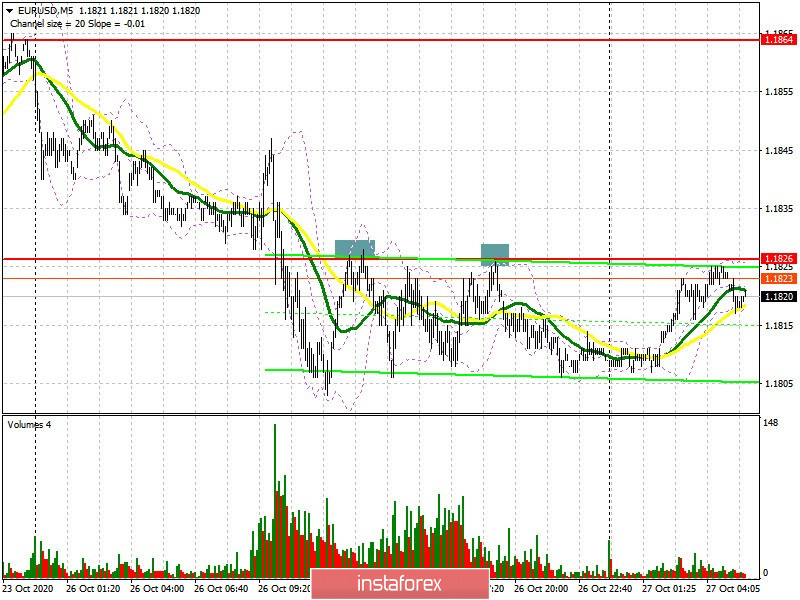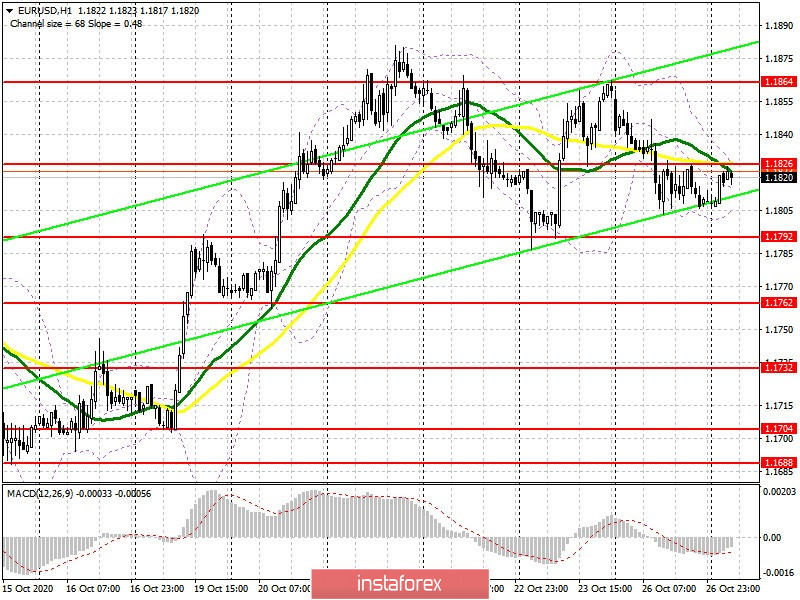To open long positions on EUR/USD, you need:
In my forecast for the afternoon, I paid attention to the signal for opening short positions in the EUR/USD pair. If you read my review and look at the 5-minute chart, you will see how the bears defended the 1.1826 resistance, which resulted in a good sell entry point. They did the same in the middle of the US session, which caused it to fall by another 20 points.

The buyers' primary task for the first half of the day is to regain control over the resistance at 1.1826. Settling at this level and testing it from top to bottom forms a good signal to open long positions, counting on the upward trend to continue, which happened last week. The bulls aim to return to the high of 1.1864, where I recommend taking profits, since this level is the upper border of the horizontal channel and it will not be so easy to pass it from the first test. But even if the euro continues to fall, it is too early to panic, since the pair could remain in a horizontal channel with the lower border at 1.1788. However, I recommend opening long positions from this area only if a false breakout is formed. It is possible to buy EUR/USD immediately on a rebound but only from a low of 1.1762, counting on a correction of 15-20 points within the day.
The Commitment of Traders (COT) report for October 20 recorded an increase in long positions and short ones. However, there were more of the latter, which led to an even greater decrease in the positive delta. Despite this, the buyers of risky assets believe in the continuation of the bull market, but prefer to act with caution, as there is no good news for the eurozone yet. Thus, long non-commercial positions increased from 228,295 to 229,878, while short non-commercial positions increased from 59,658 to 63,935. The total non-commercial net position decreased to 165,943, against 168,637 a week earlier.... However, the bullish sentiment for the euro remains rather high in the medium term. The more the euro falls against the US dollar at the end of this year, the more attractive it is for new investors.
To open short positions on EUR/USD, you need:
The sellers are doing their job so far and are not letting the pair go above the 1.1826 level, which acts as a resistance. We can expect the euro to succeedingly fall as long as trading is carried out below this range. Forming a false breakout at 1.1826 after the release of weak fundamental data on lending in the eurozone will be another signal to open short positions, as, apparently, the bullish momentum will gradually end against the background of an increase in the number of Covid-19 infections in the world. The EUR/USD bears will aim to return to support at 1.1788, settling below it will only increase the pressure on the pair, which will lead to updating the next low at 1.1761, where I recommend taking profits. If the EUR/USD grows above 1.1826 and there is no activity among sellers at this level, it is best not to rush to open short positions, but wait until the upper border of the 1.1864 horizontal channel is updated and sell the euro there for a rebound, counting on a 15-20 point correction.

Indicator signals:
Moving averages
Trading is carried out in the area of 30 and 50 moving averages, which shows that the pair is still in a horizontal channel.
Note: The period and prices of moving averages are considered by the author on the H1 hourly chart and differs from the general definition of the classic daily moving averages on the daily D1 chart.
Bollinger Bands
A breakout of the upper border of the indicator around 1.1826 will lead to a new wave of euro growth. A breakout of the lower border of the indicator in the 1.1800 area will increase the pressure on the pair.
Description of indicators
- Moving average (moving average, determines the current trend by smoothing out volatility and noise). Period 50. It is marked in yellow on the chart.
- Moving average (moving average, determines the current trend by smoothing out volatility and noise). Period 30. It is marked in green on the chart.
- MACD indicator (Moving Average Convergence/Divergence — convergence/divergence of moving averages) Quick EMA period 12. Slow EMA period to 26. SMA period 9
- Bollinger Bands (Bollinger Bands). Period 20
- Non-commercial speculative traders, such as individual traders, hedge funds, and large institutions that use the futures market for speculative purposes and meet certain requirements.
- Long non-commercial positions represent the total long open position of non-commercial traders.
- Short non-commercial positions represent the total short open position of non-commercial traders.
- Total non-commercial net position is the difference between short and long positions of non-commercial traders.
 English
English 
 Русский
Русский Bahasa Indonesia
Bahasa Indonesia Bahasa Malay
Bahasa Malay ไทย
ไทย Español
Español Deutsch
Deutsch Български
Български Français
Français Tiếng Việt
Tiếng Việt 中文
中文 বাংলা
বাংলা हिन्दी
हिन्दी Čeština
Čeština Українська
Українська Română
Română

